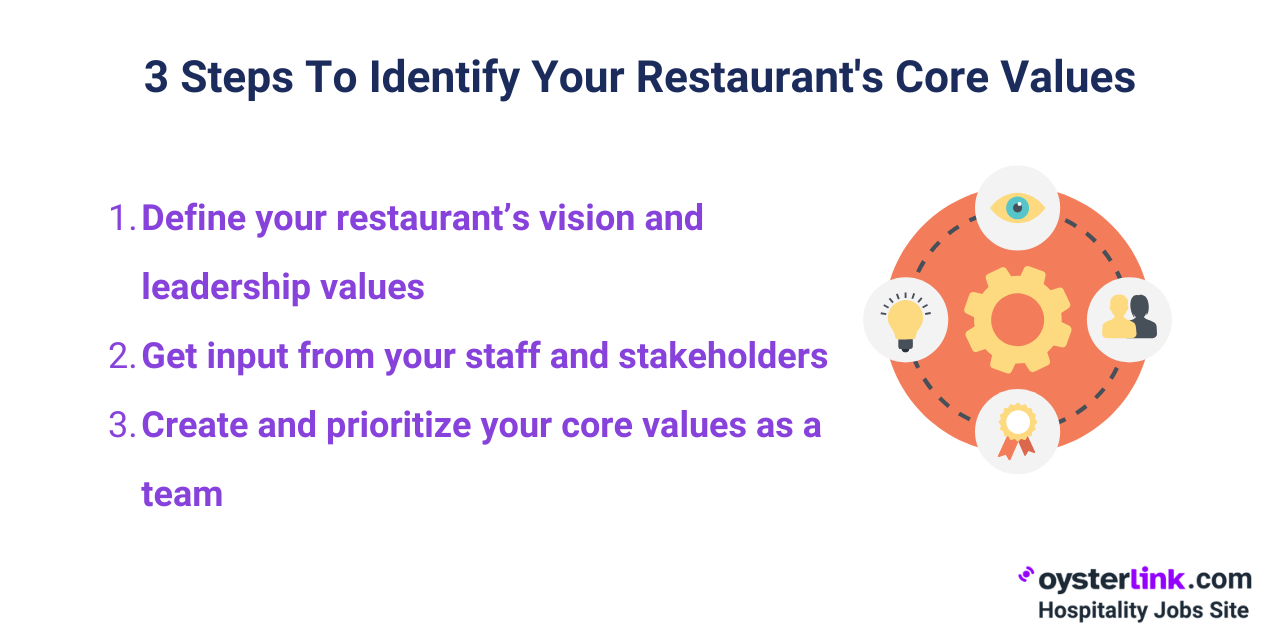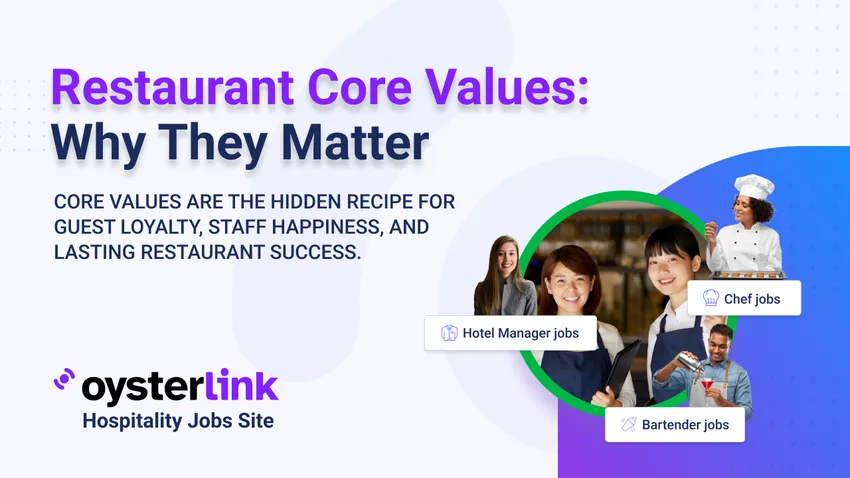Restaurant Core Values: Key Takeaways
- Restaurants that live by their values create stronger guest connections and reduce staff turnover.
- “Teamwork” is boring. Try saying things like “We’ve got each other’s backs, no matter what”.
- Restaurants that give back to the community don’t just serve food, they become neighborhood favorites.
Restaurant core values are the invisible foundation of every successful hospitality brand. They’re not just statements: they shape daily operations and long-term loyalty.
In an industry where turnover is high and competition fierce, restaurants that define and live their values stand out, build stronger teams, and deliver unforgettable experiences.
What Are Restaurant Core Values?
Core values are the fundamental beliefs and guiding principles that shape a restaurant’s identity and daily operations.
In a restaurant context, core values define what the business stands for, how it treats its staff and guests and the standards it strives to uphold.
Why core values are important in the restaurant industry
Core values set expectations for what is acceptable and inspire consistency in service, food quality and workplace morale.
When well-defined they guide how Chefs, Line Cooks, Servers and manager behave, helping to create a positive environment.
Ultimately, core values drive guest satisfaction, staff engagement and brand loyalty, influencing retention and your bottom line.
How To Identify Core Values for Your Restaurant Brand
Discovering the right core values for your restaurant isn’t a one-time task: it’s a process that involves reflection, feedback and honest collaboration.
Whether you’re launching a new concept or refining an established brand, assessment ensures your values are authentic and actionable, not just clichés on the wall.

Now, let's go through each of them one by one.
Step 1: Define your restaurant’s vision and leadership values
Restaurant owners and managers should begin by reflecting on their own beliefs and long-term vision for the restaurant. Ask questions like:
- What kind of culture do we want to create?
- What do we want to be known for?
- What do I want guests and my team to feel after a shift or a meal?
For more inspiration, check out these company values examples to build your company culture.
Step 2: Get input from staff and stakeholders
Include team members such as Chefs, Line Cooks, Bartenders and other employees at every level in the process and gather their input.
Getting real stories and examples from your staff’s perspective fosters true buy-in and ensures your values reflect the lived realities of daily service.
Don’t be afraid of direct feedback! Sometimes, the little moments mentioned by a Dishwasher become your most meaningful value stories.
Step 3: Create and prioritize your core values as a team
- Have your team share examples of “best moments” at work
- Note down what words, attitudes or actions repeat
- For each value, ask, “How would we show this in our shift?”
- Instead of “teamwork,” try “We’ve got each other’s backs, no matter what”
- Roll out your values at a team meeting
- Post them where everyone can see them!
Common Core Values in the Restaurant Industry
While every restaurant is unique, some core values often come up because they are at the heart of great restaurants and teams.
Hospitality and customer service as core value
True hospitality means making every guest feel welcome and valued.
Restaurants that prioritize customer service empower every Server, Host and Bartender to genuinely listen to feedback and solve problems.
Food quality and freshness: Core Kitchen Values
Many restaurants are built on a commitment to sourcing the best possible ingredients and holding high culinary standards.
For Chefs and Line Cooks, this value leads to strict prep, careful ingredient selection and taking pride in every plate that leaves the pass.
Teamwork and respect in restaurant culture
A culture of teamwork and respect leads to better communication, smoother service and a more supportive (and fun) workplace.
When everyone from Dishwashers to Sous Chefs feels respected, it reduces turnover and builds stronger engagement.
Community engagement as a restaurant core value
Some restaurants set themselves apart by giving back, building neighborhood relationships or championing local causes.
Community engagement builds loyalty and makes your restaurant a beloved local fixture while boosting staff pride and connection.
How Restaurant Core Values Shape Daily Operations and Service
Core values shouldn’t just be in your handbook, they need to show up in hiring, daily language, rituals and business decisions. Otherwise, what’s the point?
Hiring and training based on core values
Incorporate your core values into every stage of the employee experience, whether it's job postings, interviews or onboarding.
For example, during interviews, ask situational questions that explore teamwork and how candidates handle real scenarios.
In training sessions, share authentic guest reviews that demonstrate your values in action.
Guest interactions
How Servers, Hosts and Bartenders interact with guests flows directly from your stated values.
Encourage staff to share their own examples of living these principles at team meetings.
Menu development and innovation
When core values emphasize quality, sustainability or creativity, these beliefs guide your Chef and culinary team as they craft and update the menu.
This might mean prioritizing locally grown produce, accommodating vegan or gluten-free requests or letting a team member contribute a family recipe.
Embedding and Communicating Core Values
For core values to become a living part of your restaurant’s culture, they must be visible, reinforced and celebrated, internally and externally.
Internal communication and reinforcement
Use regular team meetings, recognition programs and visual reminders (like posters or digital screens in staff areas) to keep values front and center.
Celebrate employees who show these values in action: try a “values MVP” badge at lineup or shout-outs on your staff Slack channel.
Marketing and external messaging
Your restaurant’s values shouldn’t stay behind the scenes.
Share stories publicly: in newsletters, on menus (e.g., “Why We Source Locally”) and through social media spotlights on team members or guest feedback about your culture.
Restaurant Core Values Checklist
- Are our values posted where every staff member can see them?
- Do we open staff meetings with a value-related story or recognition?
- Is there at least one interview/onboarding question tied to our values?
- Have we solicited real examples from team members this month?
- Are our values visible in our guest communications or reviews?









Loading comments...